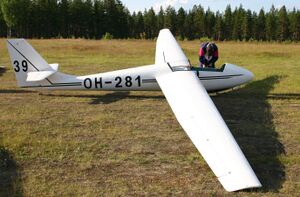Engineering:Lehtovaara PIK-16 Vasama
| PIK-16 Vasama | |
|---|---|

| |
| Role | Glider |
| National origin | Finland |
| Designer | Tuomo Tervo, Jorma Jalkanen and Kurt Hedstrom, students at the Polyteknikkojen Ilmailukerho (PIK) |
| Introduction | 1961 |
| Number built | 56 |
The Lehtovaara PIK-16 Vasama (English: Arrow) is a Finland mid-wing, single-seat, FAI Standard Class glider that was designed by Tuomo Tervo, Jorma Jalkanen and Kurt Hedstrom, who were students at the Polyteknikkojen Ilmailukerho (PIK) and produced by Lehtovaara.[1][2]
Design and development
The PIK-16 is constructed from wood, with a fibreglass nose. The 15.0 m (49.2 ft) span wing employs a Wortmann FX-05-168 (14% modification) airfoil at the wing root, transitioning to a NACA 63 (2)-165 at the wing tip. The wing features dive brakes.[1][2][3] The prototype Vasama had V tail, but it was changed to cruciform tail on production aircraft.
A total of 56 PIK-16s were built. The aircraft was not type certified but it did become the second most exported Finnish glider, surpassed only by the later PIK-20 series.[1][2][4]
Operational history
The prototype PIK-16 set a Finnish national record for a 300 km (186 mi) triangle course of 86.6 km/h (54 mph) before it had even finished flight testing.[5]
The design won the OSTIV prize at the World Gliding Championships held at Junín, Buenos Aires Province, Argentina in 1963, finishing third in the standard class.[1][2]
Variants
- PIK-16a
- Prototype with a V-tail.[3][5]
- PIK-16b
- Revised design with a cruciform tail, four built by the Finnish Aeronautical Association at the Jämi Flying School.[3][6]
- PIK-16c
- Third version[3]
Aircraft on display
- Finnish Aviation Museum[4]
Specifications (Pik-16 Vasama)
Data from The World's Sailplanes:Die Segelflugzeuge der Welt:Les Planeurs du Monde Volume II[7]
General characteristics
- Crew: 1
- Length: 5.97 m (19 ft 7 in)
- Wingspan: 15 m (49 ft 3 in)
- Height: 0.9 m (2 ft 11 in) at cockpit
- Wing area: 11.7 m2 (126 sq ft)
- Aspect ratio: 19.2
- Airfoil: Root: Wortmann FX-05-188 (14% mod), tip:NACA 632 615
- Empty weight: 166 kg (366 lb)
- Gross weight: 281 kg (619 lb)
Performance
- Stall speed: 62 km/h (39 mph, 33 kn)
- Never exceed speed: 250 km/h (160 mph, 130 kn)
- Rough air speed max: 180 km/h (111.8 mph; 97.2 kn)
- Aerotow speed: 150 km/h (93.2 mph; 81.0 kn)
- Winch launch speed: 140 km/h (87.0 mph; 75.6 kn)
- Terminal velocity: with full airbrakes 235 km/h (146 mph; 127 kn)
- g limits: +7 -4 at 160 km/h (99.4 mph; 86.4 kn)
- Maximum glide ratio: 34.5 at 86 km/h (53.4 mph; 46.4 kn)
- Rate of sink: 0.59 m/s (116 ft/min) at 73 km/h (45.4 mph; 39.4 kn)
- Wing loading: 24 kg/m2 (4.9 lb/sq ft)
See also
Related lists
References
Citations
- ↑ 1.0 1.1 1.2 1.3 Activate Media (2006). "PIK-16 Vasama Lehtovaara". http://www.sailplanedirectory.com/PlaneDetails.cfm?PlaneID=260. Retrieved 10 July 2011.
- ↑ 2.0 2.1 2.2 2.3 Said, Bob (November 1983). "1983 Sailplane Directory". Soaring Magazine (Soaring Society of America): 94.
- ↑ 3.0 3.1 3.2 3.3 Lednicer, David (2010). "The Incomplete Guide to Airfoil Usage". http://www.ae.illinois.edu/m-selig/ads/aircraft.html. Retrieved 1 July 2011.
- ↑ 4.0 4.1 Finnish Aviation Museum (2009). "PIK 16c Vasama". http://www.ilmailumuseo.fi/index.php?page=PIK-16c-Vasama. Retrieved 17 July 2011.
- ↑ 5.0 5.1 "Sport and Business". Flight International: 212. 17 August 1961. http://www.flightglobal.com/pdfarchive/view/1961/1961%20-%201110.html. Retrieved 12 April 2013.
- ↑ "Sport and Business". Flight International: 280. 23 August 1962. http://www.flightglobal.com/pdfarchive/view/1962/1962%20-%201538.html. Retrieved 12 April 2013.
- ↑ Shenstone, B.S.; K.G. Wilkinson (1963) (in English, French, German). The World's Sailplanes:Die Segelflugzeuge der Welt:Les Planeurs du Monde Volume II (1st ed.). Zurich: Organisation Scientifique et Technique Internationale du Vol a Voile (OSTIV) and Schweizer Aero-Revue. pp. 74–75.
Bibliography
- "Sport and Business". Flight International: 280. 23 August 1962. http://www.flightglobal.com/pdfarchive/view/1962/1962%20-%201538.html. Retrieved 12 April 2013.
- Shenstone, B.S.; K.G. Wilkinson (1963) (in English, French, German). The World's Sailplanes:Die Segelflugzeuge der Welt:Les Planeurs du Monde Volume II (1st ed.). Zurich: Organisation Scientifique et Technique Internationale du Vol a Voile (OSTIV) and Schweizer Aero-Revue. pp. 74–75.
- Activate Media (2006). "PIK-16 Vasama Lehtovaara". http://www.sailplanedirectory.com/PlaneDetails.cfm?PlaneID=260. Retrieved 10 July 2011.
- Lednicer, David (2010). "The Incomplete Guide to Airfoil Usage". http://www.ae.illinois.edu/m-selig/ads/aircraft.html. Retrieved 1 July 2011.
- Finnish Aviation Museum (2009). "PIK 16c Vasama". http://www.ilmailumuseo.fi/index.php?page=PIK-16c-Vasama. Retrieved 17 July 2011.
- "Sport and Business". Flight International: 212. 17 August 1961. http://www.flightglobal.com/pdfarchive/view/1961/1961%20-%201110.html. Retrieved 12 April 2013.
 |

